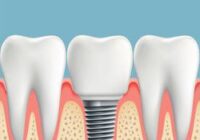
One of the things that often gets overlooked during or after cancer treatment is the mouth. Side effects of chemotherapy and radiation can be hard on the whole body but some people are truly surprised at the toll it takes on their teeth.Although no statistics seem to exist yet, if you ask a group of cancer survivors about their teeth after chemotherapy and radiation, you’ll be surprised at how many are struggling to keep up with the decay and destruction that the treatment has left in its path.
The National Institute of Dental and Craniofacial Research says that the side effects of chemotherapy treatments can make it difficult and painful for patients to eat, talk and swallow. They recommend visiting the dentist at least one month before treatment begins when possible. It’s also imperative to communicate regularly with your dentist during treatments so the doctor and dentist can work together to keep cancer patients as comfortable as possible. While undergoing cancer treatments, your body is at an increased risk for infection says Dr. Martin Abelar, DDS, San Diego area dentist.
“It’s important to see a dentist as early as possible before treatment begins so we can address any preexisting concerns and treat them before the patient begins cancer therapies,” Abelar said. “This also gives us a chance to go over the best care practices for oral hygiene during treatment and some tips on how to minimize discomfort from any potential side effects.”
Chemotherapy side effects that concern the mouth and teeth can include:
Pain in the mouth
Dry mouth
Higher likelihood of infection
Changes in taste
Burning or swelling tongue
One of the most surprisingly damaging side effects is dry mouth says Abelar.
“Saliva is far more important than people realize. When dry mouth robs your body of this valuable asset, your teeth are left unprotected,” he said. Saliva helps prevent tooth decay by keeping the enamel strong and clears food particles and bacteria from your mouth.”
To try to help with these side effect Abelar recommends keeping your mouth as hydrated as possible. Drinking lots of water along with sucking on ice chips can help alleviate some of the dry mouth. Sipping on water all throughout the day can also help keep your mouth from drying out. Talk to your doctor about prescription or over the counter saliva substitutes that could help you prevent or treat dry mouth. You can also increase your body’s production of saliva by chewing sugarless gum and eating a diet rich in fiber.
For many cancer patients, the side effects and oral problems slowly disappear after treatment has ended and their bodies and mouths attempt to right themselves. Others struggle for several years and some even battle tooth decay and other dental woes for the rest of their life. Everyone is unique and each person reacts differently. In addition, the type of treatment and medications that each cancer patient takes plays a different role when it comes to oral health.






